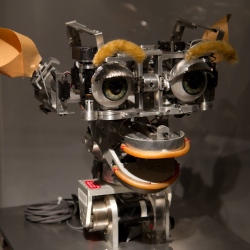
Scientists behind RoboEarth will put it through its paces at Eindhoven University in a mocked-up hospital room. Four robots will use the system to complete a series of tasks, including serving drinks to patients. It is the culmination of a four-year project, funded by the European Union.
The eventual aim is that both robots and humans will be able to upload information to the cloud-based database, which would act as a kind of common brain for machines. The system has been developed by research scientists from Philips and five European universities including Eindhoven.
"At its core RoboEarth is a world wide web for robots: a giant network and database repository where robots can share information and learn from each other," said Rene van de Molengraft, the RoboEarth project leader.
The four robots selected to test the system in a public demonstration will "work collaboratively" to help patients, he told the BBC. One robot will upload a map of the room so that others can find their way around it, others will attempt to serve drinks to patients.
"The problem right now is that robots are often developed specifically for one task," he said.
"Everyday changes that happen all the time in our environment make all the programmed actions unusable."
The aim of the system is to create a kind of ever-changing common brain for robots.
